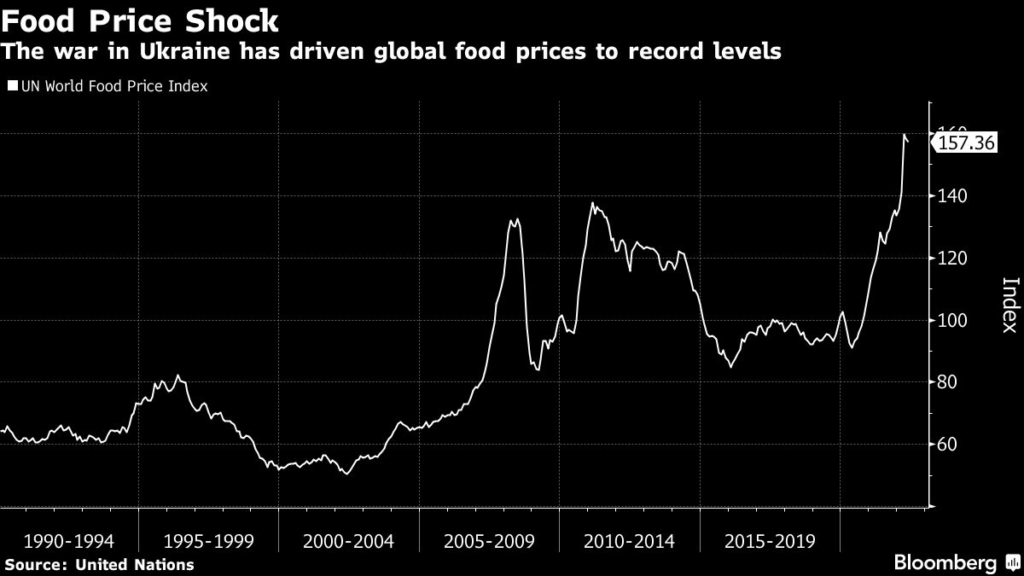(Bloomberg) — Sign up for the New Economy Daily newsletter, follow us @economics and subscribe to our podcast.
A fall in the prices of a few key global commodity indicators has raised hopes that the world economy may have reached peak inflation.
But UK households best not get carried away, economists warn.
Bloomberg analysis in the US found that a bellwether semiconductor price has dropped 14% since the middle of last year, the spot rate for shipping containers is down 26% from its September high and a 24% fall in North American fertilizer prices since March bodes well for food prices.
As four fifths of the inflation overshoot above the Bank of England’s 2% target can be blamed on “sharp increases in global energy and tradeable goods prices,” as the BOE said in May, any evidence that the external shock is easing would appear to be welcome.
UK inflation is currently at a 40-year high of 9% and may rise further when the latest data is released on June 22.
However, George Buckley, European economist at Nomura, said it would be wrong “to take too much comfort” as other indexes show little sign of easing and the UK energy price-cap will almost certainly delay peak inflation until October, when it next resets.
Gas and electricity bills jumped 54% in April and a further 42% increase is expected.
Bloomberg Economics has also pointed out that the outlook for inflation will turn on the tight labor market, switching the focus to domestic price pressures.
Buckley said a better indicator of the trajectory of UK food prices than North American fertilizer was the UN Food and Agriculture World Food Price Index.
That has been at a record high since March and tends to operate on UK grocery prices with a seven-month lag.
That would suggest food and household energy prices rising in tandem just in time for Christmas, when energy demand will be peaking too.
The BOE has warned that inflation is likely to reach double-digits at that point.
Ana Andrade and Dan Hanson of Bloomberg Economics have written that the outlook for inflation will hinge in a large part on “the 400,000 workers missing from the labor force … when compared with the start of the pandemic.” Their absence is contributing to acute labor shortages and forcing employers to hike wages, raising the risk of an inflationary spiral as firms try to protect their profit margins.
Households are shifting their spending back to services, such as going out, from the goods they bought when much of normal life was closed during the pandemic.
Just as the enforced shift in demand to goods led to soaring prices, there are signs that the switch back to services will have a similar impact due to the shortage of workers.
Year-on-year increases in prices for core services, like hospitality, have decoupled from the pre-pandemic five-year average recently, in a muted echo of the decoupling witnessed in core goods prices during lockdowns.
“You can see the gap opening up,” Buckley said.
“Everyone wants experiences and that demand is driving up services prices.” He added that the services industry was not immune to global inflation, with hospitality big buyers of energy and food, and would be looking to recover some of those costs.
As the BOE pointed out in May, “a quarter of the air transport sector’s costs are accounted for by fuel.”
A levelling off in shipping, semiconductor and energy prices will automatically bring down inflation in those areas as inflation is a measure of annual price growth.
There the signs are promising. Bloomberg’s Freightos Index on container shipping rates from China to Europe has fallen from recent highs but remains as elevated as it was in June last year, and the same is true of the Baltic Dry Index, the key global measure of shipping costs.
The question will then be whether companies can continue to rebuild their margins by raising prices and how much pressure workers can bring to bear on employers to close the gap between wage and price levels that will open up this year.
Andrade and Hanson believe the UK participation rate will recover only a third of its decline since the end of 2019, leaving the labor market “red hot” despite the economic slowdown that the cost of living crisis will bring.
With public inflation expectations for the coming 12 months at a record high of 6.1%, even if peak inflation is reached later this year, it is unlikely to fall fast.
More stories like this are available on bloomberg.com
©2022 Bloomberg L.P.











